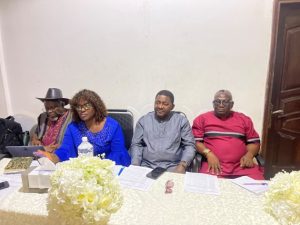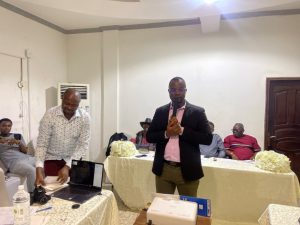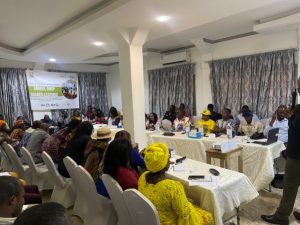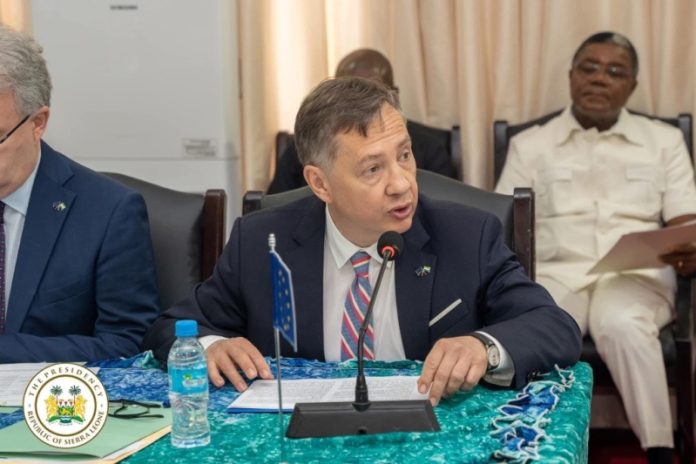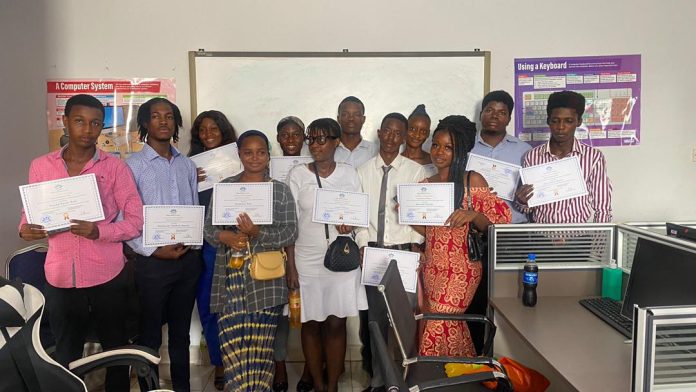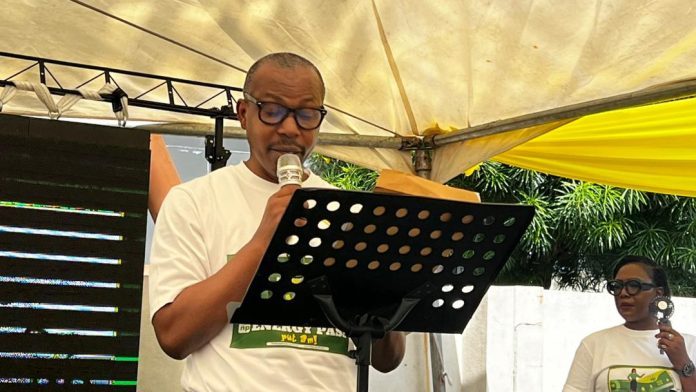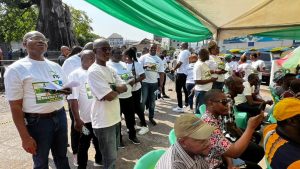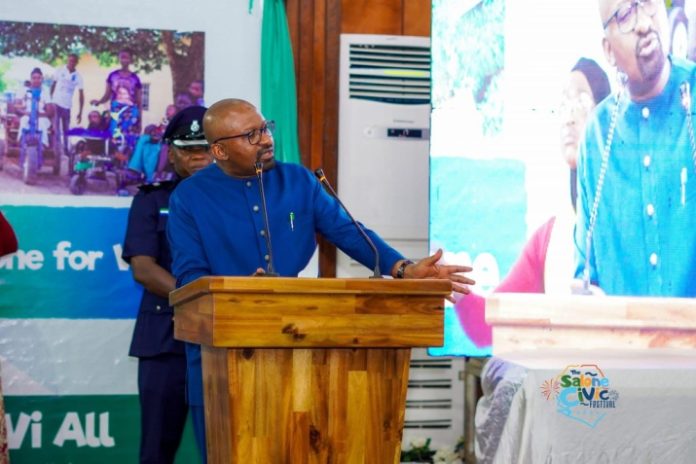By Foday Moriba Conteh
As part of their efforts towards creating an opportunity for stakeholders to align strategies, build stronger partnerships and reaffirm their commitment to transforming Sierra Leone’s land governance ecosystem, Land for Life Sierra Leone and partners has successfully concluded its Annual District Multi-Stakeholder Platform (DMSP) Shared-Learning Session on Friday, December 13, 2024, at De Wizzard Main Hall, Dambala Road, Bo City, Southern Province of Sierra Leone.
The event, held under the theme: “Strengthening Multi-Stakeholders Collaboration for Total Transformation in the Land and Food Security Sector of Sierra Leone,” brought together key stakeholders from across the country to exchange experiences and strengthen collaboration in the land governance sector.
Representatives from the eight district-level MSPs (DMSPs) in Kenema, Pujehun, Bo, Port-Loko, Kambia, Bombali, Tonkolili and Kono participated in the session. Since their establishment in 2020, these platforms have played significant roles in promoting inclusive and sustainable land governance practices aimed at advancing national development, reducing poverty and addressing hunger in Sierra Leone.
In his address, the National Coordinator of the Land for Life Initiative Sierra Leone, Berns Komba Lebbie, emphasized that land governance is a critical issue that cannot be taken lightly, as the demand for land continues to rise, making its governance increasingly complex. He noted that access to and rights over land have become highly contested, with everyone competing for ownership and use.
Berns Komba Lebbie explained that five to six years ago, the Land for Life Initiative began promoting inclusive land governance for development. He added that organizations like Welt Hunger supported the establishment of Local Land Committees and the District Multi-Stakeholder Platforms (DMSPs), while the FAO had simultaneously initiated the Technical Working Group.
He highlighted that, while engagements at the national level are being spearheaded by the FAO and the Ministry of Lands, Housing and Country Planning, Civil Society Organizations (CSOs) and development partners saw the need to focus on the local level to complement the Government’s national efforts.
To achieve this, Berns Komba Lebbie stated that Land for Life began district-level engagements, with Pujehun being the first district visited due to the severity of land issues in the area. He referenced a February 2019 land dispute in Pujehun that tragically led to the loss of lives, which underscored the urgency of collective efforts in resolving land issues across Sierra Leone.
He also explained that they initially launched DMSPs in four districts, Pujehun, Kenema, Port Loko and Tonkolili with funding from Welt Hunger. Building on the success of these platforms, FAO and Green Scenery partnered with Land for Life last year to expand the DMSPs to three additional districts: Bo, Kambia and Bombali. Additionally, Resolve supported the establishment of the platform in Kono, bringing the total number of DMSP districts to eight.
Berns Komba Lebbie expressed optimism that, with further support, DMSPs will be established in the remaining districts, ensuring a nationwide framework for addressing land governance challenges.
Jobo Samba, Land Tenure Expert for SLLAP (formerly the VGGT Technical Working Group Coordinator), stated that in 2014, the Voluntary Guidelines on the Responsible Governance of Tenure of Land were introduced to serve as a framework for recognizing and respecting tenure rights and their holders.
He noted that since 2014, the Government of Sierra Leone has been implementing these Voluntary Guidelines across the country, which, he said, has had a significant impact on land governance in Sierra Leone.
Jobo Samba highlighted that one key impact of the Voluntary Guidelines is the ongoing land reforms currently being undertaken by the Government. He emphasized that these reforms are a direct result of the implementation of the Voluntary Guidelines, contributing to improved land governance nationwide.
Abu A. Brima, Executive Director of the Network Movement for Justice and Development (NMJD), who also serves as the Chairman of the Land for Life Executive Board, emphasized that the importance of land cannot be overstated, noting that its increasing demand for various uses has made land governance problematic.
He highlighted that the implementation of the Voluntary Guidelines on the Responsible Governance of Tenure (VGGT) has significantly contributed to changing the laws around land governance in Sierra Leone over the years. However, he pointed out that during this period of transformation, several challenges emerged.
Abu A. Brima explained that it became evident that women, persons with disabilities and youths who constitute the active population were often excluded from key aspects of land governance, including decision-making, rights, use, control and management. He stressed that such exclusion hinders national development, as any process involving land that fails to include these groups only benefits individuals rather than the country as a whole.
To address these gaps, Abu A. Brima noted that the land policy development, which eventually led to the creation of the land law, began with the active involvement and participation of civil society organizations. He added that during this process, they utilized the VGGT, a human rights-oriented tool, which advocates for the recognition, respect, and protection of women and other vulnerable groups in matters relating to land.
In her keynote address, the Deputy Commissioner General of the National Lands Commission, Susan M. Rogers, expressed appreciation to Land for Life and its partners for organizing the Annual District Multi-Stakeholder Platform (DMSP) Shared-Learning Session, which she described as critical for transforming Sierra Leone’s land governance ecosystem.
She informed the gathering that the National Lands Commission, established about two years ago, is mandated to address land-related issues across the country. Susan M. Rogers highlighted that the Commission’s formation was followed by the enactment of the Customary Land Rights Act of 2022, a groundbreaking legislation designed to protect customary land rights, eliminate discrimination and manage land governance under customary laws.
The Deputy Commissioner noted that over 90 percent of land in Sierra Leone is located in the provinces, rather than in Freetown, emphasizing that the challenges surrounding land governance in the provinces are expected to be more significant. However, she assured the audience that, with the continued support of the Minister and Deputy Minister of Lands and Country Planning, these challenges will be effectively addressed.
She commended Land for Life for its inclusive platforms that address land-related challenges and promote equitable development. Susan M. Rogers assured the organization of the Commission’s unwavering support in their collective efforts to improve land governance across Sierra Leone.
During the session, participants shared success stories, challenges and lessons learned in their respective districts, fostering dialogue on improving land governance systems. Participants lauded the initiative, highlighting its role in creating inclusive platforms for addressing land-related challenges and promoting equitable development.
